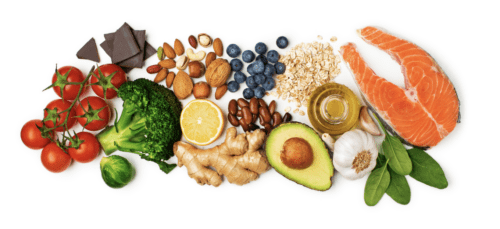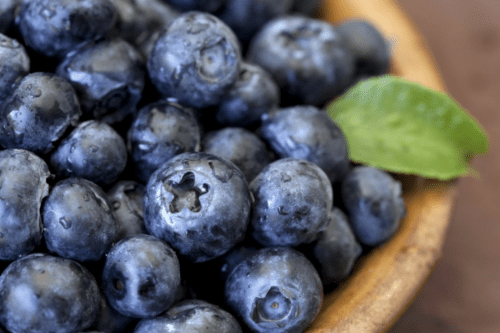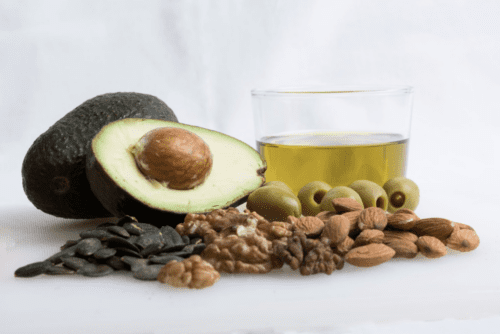Key Takeaways
- Nutrient-dense foods contain vitamins, minerals, lean protein and healthy fat to support overall health.
- Common nutrient-dense foods include fresh fruits, vegetables, fatty fish, nuts, seeds and lean meats.
- Staying educated about the best foods to incorporate into your diet can help you lead a healthy lifestyle and feel your best.
- Incorporating nutrient-dense foods into your diet can be simple with the right planning and preparations.
You have to eat food every day to survive, so you might as well enjoy foods that are going to fuel good health and make you feel your best. Incorporating nutrient-dense foods into your diet has a wide range of benefits, including helping with weight management, preventing nutrient deficiencies and lowering your risk of chronic diseases.

What Are Nutrient-Dense Foods?
Nutrient-dense foods are those that are high in vitamins and minerals, but also have a substantial amount of lean proteins and healthy fats. Some common nutrient-dense foods include fruits, vegetables, whole grains, nuts, legumes, lean meats and eggs.
Understanding Nutrient Density
Nutrient density is a comparison of how many nutrients a food has in relation to its calories. Salmon is an example of a nutrient-dense food because it is high in vitamin B12 and is a good source of lean protein, while not being very high in calories. Contrarily, highly processed foods like potato chips are calorie-dense, as opposed to nutrient-dense, because they are high in calories but lacking in important nutrients.
Why is it Important to Include Nutrient-Dense Foods in Your Daily Eating?
There are many reasons why it is important to include nutrient-dense foods in your diet. Some benefits of eating nutrient-dense foods include:
- Improved energy levels
- Lowered risk of chronic disease
- Reduced risk of nutrient deficiencies
- Weight management
- Improved immune function
The Lifestyle Medicine providers at UCF Health Faculty Physician Practice can help you get on track with healthy eating and positive lifestyle choices.
The Science Behind Nutrient-Dense Foods
Nutrient-dense foods are good for your body in a variety of ways. Some of the physiological benefits of eating nutrient-dense foods include:
- Energy production
- Cellular health
- Immune support
- Gut health
- Brain function
What Are Some Nutrient-Dense Foods?
Now that you know all of the great benefits of eating nutrient-dense foods, you’re probably ready to find out which nutrient-dense foods are best to incorporate into your daily diet. Below you will find some nutrient-dense foods you can easily add into your diet for overall health and wellness.
Leafy Greens
Leafy greens like spinach and kale are rich in nutrients and vitamins that help support overall health and bodily functions. Spinach is rich in iron, vitamins A and C, and antioxidants which support energy levels and immune health. Kale is high in vitamin K and calcium which support bone health.
Fruits

Fresh fruits are nutrient-dense foods that offer healthy carbohydrates, vitamins and minerals. Blueberries are high in antioxidants which support brain health and reduce inflammation. Oranges are high in vitamin C which boosts the immune system and supports skin health.
Lean Proteins
Lean meats and proteins like salmon and chicken are nutrient-dense foods that help nourish the body and support energy levels. Salmon is rich in omega-3 fatty acids that support heart and brain health. Chicken breast aids in muscle recovery and growth.
Nuts and Seeds
Almonds, chia seeds and walnuts are rich in nutrients and easy to incorporate into any diet.
Nuts and seeds are high in healthy fats, antioxidants and fiber which support good digestion and heart and brain health.
Whole Grains
Whole grains like quinoa and brown rice are nutrient-dense substitutes for refined grains like white bread and pasta. Quinoa is a complete protein that is high in fiber and helps provide long-lasting energy. Brown rice is a healthy carbohydrate because it is high in manganese and selenium which support a healthy metabolism.
Legumes
[Imagery suggestion: image of legumes or beans]
Legumes like lentils, chickpeas and black beans offer protein and fiber and can easily be incorporated into your diet. They can be added to soups and salads or enjoyed on their own. These superfoods support energy levels, heart health and digestive health.
Dairy and Dairy Alternatives
High-quality dairy products and dairy alternatives can be good sources of protein, vitamins, minerals and probiotics. It is important to choose organic dairy products that are free from preservatives, hormones and antibiotics. Some examples include:
- Greek Yogurt: Greek yogurt is high in protein and contains probiotics, supporting digestive health and muscle maintenance.
- Kefir: Kefir is a great source of probiotics, calcium and protein.
- Fortified Almond Milk: Fortified almond milk contains calcium and vitamin D, making it a great milk alternative for those who are dairy-free.
Vegetables
Vegetables like sweet potatoes, carrots, broccoli and red bell peppers can add extra vitamins and fiber to your diet. Sweet potatoes are high in beta-carotene and are a good source of carbohydrates. Carrots are filled with vitamin A and antioxidants which help support vision and skin health. Broccoli is a good source of vitamin C and vitamin K.
Fish and Seafood
[Imagery suggestion: image of fish or seafood]
Fish are high in healthy fats and vitamins that help support bone and heart health. Sardines and cod are both rich in vitamin D which can be hard to find in foods. Fish is also high in omega-3 fatty acids which support cell function and reduce inflammation.
Meat Alternatives
For those who don’t eat meat, there are nutrient-dense meat alternatives. Tempeh and tofu both offer protein, iron and calcium. These meat alternatives can support muscle growth and healthy energy levels for people who don’t eat real meat.
Herbs and Spices
Adding certain spices to your food can provide anti-inflammatory benefits. Turmeric contains curcumin which helps lower inflammation and support joint health. Ginger is rich in antioxidants and supports the immune and digestive systems.
Additional Whole Grains
Whole grains like oats and barley are beneficial in your diet. Oats are high in fiber and protein, supporting heart and digestive health. Barley is found in some breads and cereals and is rich in fiber, vitamins and minerals.
Oils and Healthy Fats

Remember, not all fats are bad. Incorporating healthy fats like olive oil and avocado oil into your diet can help support your health in several ways. Olive oil supports heart health and reduces inflammation because it contains monounsaturated fats and antioxidants. Avocado oil is high in healthy fats and vitamin E, making it good for heart health and skin.
Fermented Foods
Supporting your gut health helps boost overall health and immunity. Fermented foods contain probiotics that support your gut’s natural microbiome. Common fermented foods include sauerkraut and kimchi.
How To Incorporate Nutrient-Dense Foods in Daily Meals
If you’re just beginning your health journey, you may feel overwhelmed at the thought of incorporating nutrient-dense foods into your daily meals. Below are some tips to help you get started.
Meal Planning Tips
Plan your meals ahead of time and stock up on all the ingredients needed to cook nutrient-dense meals. Some recipes make it easy to add several nutrient-dense foods into one meal, such as smoothies and salads. It is important to have nutrient-dense foods with each meal of the day, so having fruits and veggies on hand is helpful.
Recipes and Meal Prep Ideas
Look up some recipes and prep food ahead of time to make healthy eating easy. Try some quick and simple recipes so that eating healthy doesn’t have to be a challenge. Prep healthy snacks ahead of time, such as veggie sticks or sliced fruit, so that you have something nutritious to grab quickly when hunger strikes.
[CTA: Visit UCF Health Faculty Physician Practice’s Lifestyle Resources for Nutritional Guidance]
Tips for Cooking With Nutrient-Dense Foods
Many nutrient-dense foods are easier to cook than you’d think, but it’s important not to overcook them to retain as many nutrients as possible. When boiling, use as little water as possible. Shorter cooking times for vegetables will help ensure the nutrients aren’t cooked out of them. Adding minimal amounts of oil when cooking will also help preserve the food’s natural vitamins.
Frequently Asked Questions About Nutrient-Dense Foods
What Food Is the Most Nutrient-Dense?
While there are a wide variety of nutrient-dense foods, leafy greens and fatty fish are considered to be some of the best options because they offer the most health benefits.
How Can I Ensure I’m Eating Nutrient-Dense Foods?
You’ll want to avoid packaged, processed foods as much as possible and opt for whole foods as often as you can. When you do buy packaged foods, get in the habit of reading ingredient labels to choose the healthiest options.
Can Nutrient Dense Foods Help With Weight Loss?
Yes, nutrient-dense foods are a great option for people who are trying to lose weight. Foods that are nutrient-dense help you feel full and satisfied for longer, helping to prevent overeating and build healthy habits.
Taking the Next Step Toward Healthier Food Choices
Prioritizing nutrient-dense foods in your diet may be easier than you realize and the benefits are undeniable. You’ll feel healthier and happier when eating a nutrient-dense diet and you can lower your risk of developing chronic diseases. Getting started on a healthy diet can be challenging, so take small steps and seek out professional help when needed.
At UCF Health Faculty Physician Practice, we understand the importance of leading a healthy lifestyle. Let our Lifestyle Medicine professionals help lead you on a path to wellness and optimal health. Schedule your visit today.
Sources
https://www.cancer.gov/publications/dictionaries/cancer-terms/def/nutrient-dense-food#
